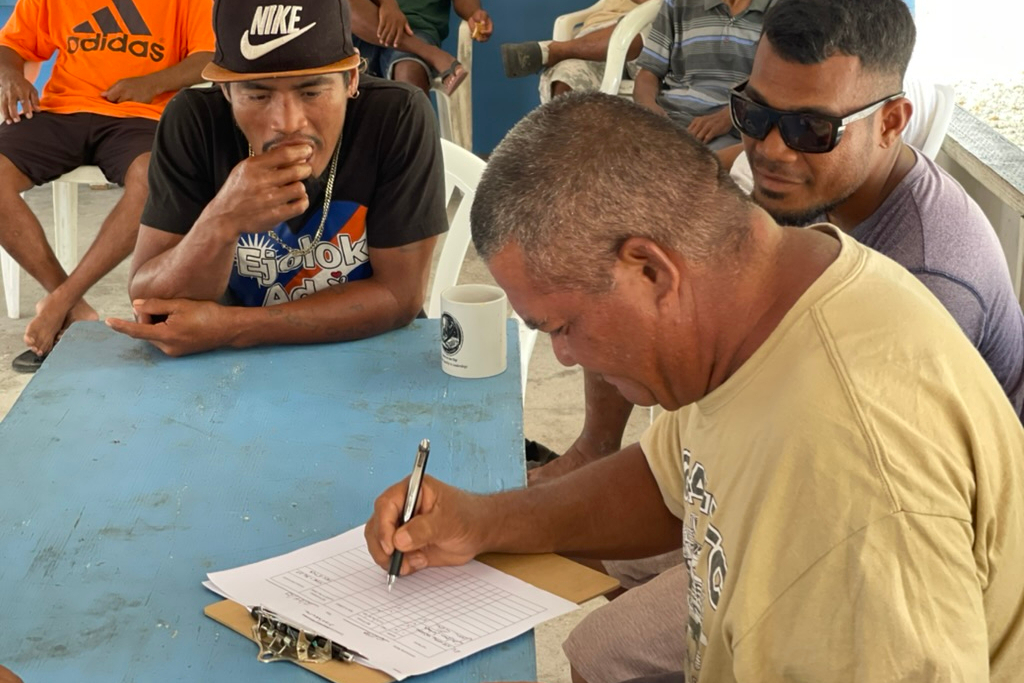New phase on water security interventions in Marshall Islands commences
May 18, 2023

Children from Wotho community during Technical Design Survey (TDS) disclosure mission in Wotho Atoll.
The detailed Technical Design Survey (TDS) for 112 communities in 24 neighboring atolls and islands of the Republic of the Marshall Islands (RMI) has been completed.
The TDS assesses the extent of improvement required in a particular household and community Rainwater Harvesting System (RWHS) and Groundwater Wells to determine the water shortage (gap) each household and community is experiencing during baseline drought (non-climate) and climate induced drought days.
The TDS was made possible through the United Nations Development Programme (UNDP) through the RMI Addressing Climate Vulnerability in the Water Sector (ACWA) Project, with strong leadership of Government of Marshall Islands, particularly Environmental Protection Authority (EPA).
This exercise was able to create tailor made Water Investment Plan through upgrading existing RWHS at household and community, and/or new additional community RWHS and rehabilitation of groundwater wells to address water gap in each community and be able to provide an all-year-round water supply for the community.
The 24 neighboring atolls and islands are geographically sparsely located and spread over an ocean area of over two million square kilometers. Some atolls have lagoons less than one kilometer wide, but most are two to three kilometers at their narrowest point and the highest point above sea level is only three meters. Logistical arrangement was one of the challenges to access neighboring atolls and islands, but tremendous support from local government, traditional leaders and community members has enabled the Project to break through the challenges to reach most marginalized people in the remote communities.

Setting up Community-based Water Committee in Wotho Atoll. (Photo: UNDP/Koji Kumamaru)

Wotho community participating Technical Design Survey (TDS) disclosure meeting in Wotho Atoll. (Photo: Carlson Jorlanin)
The ACWA Project is now moving to the next phase, which is the TDS disclosure and verification process. The main purpose of TDS disclosure is to provide all collected data and information to the leadership and community members to inform the results of water gap analysis and to propose water investment plan for each community.
“This exercise enhances our accountability and transparency of the project to engage all relevant stakeholders throughout the project cycle,” said Koji Kumamaru, ACWA Project Manager.
Upon completion of TDS disclosure meeting and endorsement on proposed water investment plan by local and traditional leaders, Rainwater Harvesting System (RWHS) upgrade and rehabilitation of groundwater wells will take place at the community level in the atolls and islands. During the TDS disclosure meeting with communities, technical site verification process is also ongoing to further check collected data and information from household and community RWHS and groundwater wells further ensuring they are accurate to finalize water investment plans.
During the TDS disclosure mission to the atolls and islands, the ACWA project team consulted with communities to establish community-based water committees to ensure sustainable and equitable access to safe drinking water for communities through appropriate monitoring, operation and maintenance of rainwater harvesting systems, coordination of all water-related activities including community awareness raising and community level drought contingency and water safety plan.
So far, the TDS disclosure meetings have been completed at Namu, Lib, Kwajalein, Enewetak, Lae, Ujae and Wotho atolls and island with respective leaders and communities. In parallel, the project has been initiating the procurement of material for RWHS and groundwater well protection as it moves towards the installation phase in the second half of 2023.
The recent TDS disclosure mission was done at Wotho Atoll. Being one of the more remote atolls as well as, in the words of Wotho MP and RMI President David Kabua the most arid. With this distinction, it is no wonder why the people of Wotho have always been at the forefront in terms of seeking assistance for water security.

ACWA project team presenting Grievance Redress Mechanism by setting up suggestion box. (Photo: Carlson Jorlanin)

ACWA project team delivering results of water gap analysis from the TDS and proposing water investment plan in Wotho Atoll. (Photo: Carlson Jorlanin)
During the Wotho disclosure, the team solicited the community’s engagement by conducting informal meetings with local and traditional leadership, community disclosure exercise, and meeting with the Wotho Community-based Water Committee. At all the meetings, the team stressed the important role of the community in the successful implementation of the project, the need for in-kind contribution, for continued feedback on progress, and most importantly the fact ACWA is a support vehicle and that the residents must take collective ownership of the project for it to be successful.
“We have just emerged from a drought that extended over six months and the situation got to a point that contents of all household and community water catchments were exhausted, and our people were left with only one source of drinking water, the largest cement catchment,” said Mr. Melinmar Anjerok, community elder from Wohto Atoll.
He added, “So as one who has experienced numerous droughts, dry spells, crop depredation due to erratic weather patterns in my nearly seventy years of existence, I can say with certainty that interventions by ACWA to ensure water security may slow the out migration of our people to urban centers and incentivize them to remain and carry on the legacy of our ancestors who bestowed us with our beautiful island.”
The success of the long-term engagement with Wotho is clearly demonstrated by the Community-based Water Committee had already been established before the team’s arrival, the balanced number of women and men attending the meetings, and the recruitment of a proactive Site Coordinator. On the mission, the team were able to successfully mediate on a question of transparency in the election of the Community Water Committee officers.
For more information:
Koji Kumamaru (Ph.D), ACWA Project Manager, UNDP; email: koji.kumamaru@undp.org

 Locations
Locations

